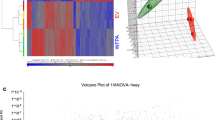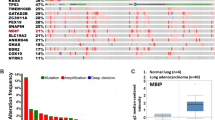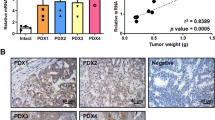Abstract
Survival signaling is critical for the metastatic program of cancer cells. The current study investigated the role of Akt survival proteins in colorectal cancer (CRC) metastasis and explored potential mechanisms of Akt-mediated metastasis regulation. Using an orthotopic implantation model in mice, which uniquely recapitulates the entire multistep process of CRC metastasis, combined with an inducible system of short hairpin RNA-mediated Akt isoform knockdown in human CRC cells, our studies confirm a role of Akt2 in CRC cell dissemination to distant organs in vivo. Akt2 deficiency profoundly inhibited the development of liver lesions in mice, whereas Akt1 had no effect under the experimental conditions used in the study. Array analysis of human metastatic genes identified the scaffolding protein metastasis suppressor 1 (MTSS1) as a novel Akt2-regulated gene. Inducible loss of Akt2 in CRC cells robustly upregulated MTSS1 at the messenger RNA and protein level, and the accumulated protein was functionally active as shown by its ability to engage an MTSS1-Src-cortactin inhibitory axis. MTSS1 expression led to a marked reduction in levels of functional cortacin (pcortactin Y421), an actin nucleation-promoting factor that has a crucial role in cancer cell invasion and metastasis. MTSS1 was also shown to mediate suppressive effects of Akt2 deficiency on CRC cell viability, survival, migration and actin polymerization in vitro. The relevance of these findings to human CRC is supported by analysis of The Cancer Genome Atlas (TCGA) and NCBI GEO data sets, which demonstrated inverse changes in expression of Akt2 and MTSS1 during CRC progression. Taken together, the data identify MTSS1 as a new Akt2-regulated gene, and point to suppression of MTSS1 as a key step in the metastasis-promoting effects of Akt2 in CRC cells.
This is a preview of subscription content, access via your institution
Access options
Subscribe to this journal
Receive 50 print issues and online access
$259.00 per year
only $5.18 per issue
Buy this article
- Purchase on Springer Link
- Instant access to full article PDF
Prices may be subject to local taxes which are calculated during checkout











Similar content being viewed by others
References
Jemal A, Murray T, Ward E, Samuels A, Tiwari RC, Ghafoor A et al. Cancer statistics, 2005. CA Cancer J Clin 2005; 55: 10–30.
Jin K, Gao W, Lu Y, Lan H, Teng L, Cao F . Mechanisms regulating colorectal cancer cell metastasis into liver (Review). Oncol Lett 2012; 3: 11–15.
National Cancer InstituteSEER Stat Fact Sheets: Colon and Rectum Cancer. Surveillance, Epidemiology and End Results Program [online] 2010..
Weigelt B, Peterse JL, van 't Veer LJ . Breast cancer metastasis: markers and models. Nat Rev Cancer 2005; 5: 591–602.
Kienast Y, von Baumgarten L, Fuhrmann M, Klinkert WE, Goldbrunner R, Herms J et al. Real-time imaging reveals the single steps of brain metastasis formation. Nat Med 2009; 16: 116–122.
Grabinski N, Bartkowiak K, Grupp K, Brandt B, Pantel K, Jucker M . Distinct functional roles of Akt isoforms for proliferation, survival, migration and EGF-mediated signalling in lung cancer derived disseminated tumor cells. Cell Signal 2011; 23: 1952–1960.
Salmena L, Carracedo A, Pandolfi PP . Tenets of PTEN tumor suppression. Cell 2008; 133: 403–414.
Manning BD, Cantley LC . AKT/PKB signaling: navigating downstream. Cell 2007; 129: 1261–1274.
Sarbassov DD, Guertin DA, Ali SM, Sabatini DM . Phosphorylation and regulation of Akt/PKB by the rictor-mTOR complex. Science 2005; 307: 1098–1101.
Stokoe D, Stephens LR, Copeland T, Gaffney PR, Reese CB, Painter GF et al. Dual role of phosphatidylinositol-3,4,5-trisphosphate in the activation of protein kinase B. Science 1997; 277: 567–570.
Brognard J, Sierecki E, Gao T, Newton AC . PHLPP and a second isoform, PHLPP2, differentially attenuate the amplitude of Akt signaling by regulating distinct Akt isoforms. Mol Cell 2007; 25: 917–931.
Gewinner C, Wang ZC, Richardson A, Teruya-Feldstein J, Etemadmoghadam D, Bowtell D et al. Evidence that inositol polyphosphate 4-phosphatase type II is a tumor suppressor that inhibits PI3K signaling. Cancer Cell 2009; 16: 115–125.
Cho H, Mu J, Kim JK, Thorvaldsen JL, Chu Q, Crenshaw EB 3rd et al. Insulin resistance and a diabetes mellitus-like syndrome in mice lacking the protein kinase Akt2 (PKB beta). Science 2001; 292: 1728–1731.
Easton RM, Cho H, Roovers K, Shineman DW, Mizrahi M, Forman MS et al. Role for Akt3/protein kinase Bgamma in attainment of normal brain size. Mol Cell Biol 2005; 25: 1869–1878.
Agarwal E, Brattain MG, Chowdhury S . Cell survival and metastasis regulation by Akt signaling in colorectal cancer. Cell Signal 2013; 25: 1711–1719.
Irie HY, Pearline RV, Grueneberg D, Hsia M, Ravichandran P, Kothari N et al. Distinct roles of Akt1 and Akt2 in regulating cell migration and epithelial-mesenchymal transition. J Cell Biol 2005; 171: 1023–1034.
Yoeli-Lerner M, Yiu GK, Rabinovitz I, Erhardt P, Jauliac S, Toker A . Akt blocks breast cancer cell motility and invasion through the transcription factor NFAT. Mol Cell 2005; 20: 539–550.
Chau NM, Ashcroft M . Akt2: a role in breast cancer metastasis. Breast Cancer Res 2004; 6: 55–57.
Ericson K, Gan C, Cheong I, Rago C, Samuels Y, Velculescu VE et al. Genetic inactivation of AKT1, AKT2, and PDPK1 in human colorectal cancer cells clarifies their roles in tumor growth regulation. Proc Natl Acad Sci USA 2010; 107: 2598–2603.
Nakatani K, Thompson DA, Barthel A, Sakaue H, Liu W, Weigel RJ et al. Up-regulation of Akt3 in estrogen receptor-deficient breast cancers and androgen-independent prostate cancer lines. J Biol Chem 1999; 274: 21528–21532.
Rychahou PG, Kang J, Gulhati P, Doan HQ, Chen LA, Xiao SY et al. Akt2 overexpression plays a critical role in the establishment of colorectal cancer metastasis. Proc Natl Acad Sci USA 2008; 105: 20315–20320.
Chowdhury S, Howell GM, Rajput A, Teggart CA, Brattain LE, Weber HR et al. Identification of a novel TGFbeta/PKA signaling transduceome in mediating control of cell survival and metastasis in colon cancer. PLoS One 2011; 6: e19335.
Chowdhury S, Ongchin M, Sharratt E, Dominguez I, Wang J, Brattain MG et al. Intra-tumoral heterogeneity in metastatic potential and survival signaling between iso-clonal HCT116 and HCT116b human colon carcinoma cell lines. PLoS One 2013; 8: e60299.
Geng L, Chaudhuri A, Talmon G, Wisecarver JL, Are C, Brattain M et al. MicroRNA-192 suppresses liver metastasis of colon cancer. Oncogene 2013; 33: 5332–5340.
Leiphrakpam PD, Rajput A, Mathiesen M, Agarwal E, Lazenby AJ, Are C et al. Ezrin expression and cell survival regulation in colorectal cancer. Cell Signal 2014; 26: 868–879.
Wang J, Rajput A, Kan JL, Rose R, Liu XQ, Kuropatwinski K et al. Knockdown of Ron kinase inhibits mutant phosphatidylinositol 3-kinase and reduces metastasis in human colon carcinoma. J Biol Chem 2009; 284: 10912–10922.
Williams B, Schneider RJ, Jamal S . Akt and PI3K-dependent but CREB-independent upregulation of MCAM by endothelin-3 in human melanocytes. Melanoma Res 2014; 24: 404–407.
Navenot JM, Fujii N, Peiper SC . KiSS1 metastasis suppressor gene product induces suppression of tyrosine kinase receptor signaling to Akt, tumor necrosis factor family ligand expression, and apoptosis. Mol Pharmacol 2009; 75: 1074–1083.
Cheng GZ, Chan J, Wang Q, Zhang W, Sun CD, Wang LH . Twist transcriptionally up-regulates AKT2 in breast cancer cells leading to increased migration, invasion, and resistance to paclitaxel. Cancer Res 2007; 67: 1979–1987.
Du P, Ye L, Li H, Yang Y, Jiang WG . The tumour suppressive role of metastasis suppressor-1, MTSS1, in human kidney cancer, a possible connection with the SHH pathway. J Exp Ther Oncol 2013; 10: 91–99.
Du P, Ye L, Ruge F, Yang Y, Jiang WG . Metastasis suppressor-1, MTSS1, acts as a putative tumour suppressor in human bladder cancer. Anticancer Res 2011; 31: 3205–3212.
Xie F, Ye L, Chen J, Wu N, Zhang Z, Yang Y et al. The impact of metastasis suppressor-1, MTSS1, on oesophageal squamous cell carcinoma and its clinical significance. J Transl Med 2011; 9: 95.
Zhou L, Li J, Shao QQ, Guo JC, Liang ZY, Zhou WX et al. Expression and significances of MTSS1 in pancreatic cancer. Pathol Oncol Res 2015; 22: 7–14.
Fan H, Chen L, Zhang F, Quan Y, Su X, Qiu X et al. MTSS1, a novel target of DNA methyltransferase 3B, functions as a tumor suppressor in hepatocellular carcinoma. Oncogene 2011; 31: 2298–2308.
Mattila PK, Salminen M, Yamashiro T, Lappalainen P . Mouse MIM, a tissue-specific regulator of cytoskeletal dynamics, interacts with ATP-actin monomers through its C-terminal WH2 domain. J Biol Chem 2003; 278: 8452–8459.
Woodings JA, Sharp SJ, Machesky LM . MIM-B, a putative metastasis suppressor protein, binds to actin and to protein tyrosine phosphatase delta. Biochem J 2003; 371 (Pt 2): 463–471.
Bershteyn M, Atwood SX, Woo WM, Li M, Oro AE . MIM and cortactin antagonism regulates ciliogenesis and Hedgehog signaling. Dev Cell 2010; 19: 270–283.
Skrzypczak M, Goryca K, Rubel T, Paziewska A, Mikula M, Jarosz D et al. Modeling oncogenic signaling in colon tumors by multidirectional analyses of microarray data directed for maximization of analytical reliability. PLoS One 2010; 5: e0013091.
Arboleda MJ, Lyons JF, Kabbinavar FF, Bray MR, Snow BE, Ayala R et al. Overexpression of AKT2/protein kinase Bbeta leads to up-regulation of beta1 integrins, increased invasion, and metastasis of human breast and ovarian cancer cells. Cancer Res 2003; 63: 196–206.
Wolmark N, Cruz I, Redmond CK, Fisher B, Fisher ER . Tumor size and regional lymph node metastasis in colorectal cancer. A preliminary analysis from the NSABP clinical trials. Cancer 1983; 51: 1315–1322.
Lee YG, Macoska JA, Korenchuk S, Pienta KJ . MIM, a potential metastasis suppressor gene in bladder cancer. Neoplasia 2002; 4: 291–294.
Jahid S, Sun J, Edwards RA, Dizon D, Panarelli NC, Milsom JW et al. miR-23a promotes the transition from indolent to invasive colorectal cancer. Cancer Discov 2012; 2: 540–553.
Li J, Chen Y, Guo X, Zhou L, Jia Z, Tang Y et al. Inhibition of miR-15b decreases cell migration and metastasis in colorectal cancer. Tumour Biol 2016; 37: 8765–8773.
Wang Y, Liu J, Smith E, Zhou K, Liao J, Yang GY et al. Downregulation of missing in metastasis gene (MIM) is associated with the progression of bladder transitional carcinomas. Cancer Invest 2007; 25: 79–86.
Wu W, Wang Z, Yang P, Yang J, Liang J, Chen Y et al. MicroRNA-135b regulates metastasis suppressor 1 expression and promotes migration and invasion in colorectal cancer. Mol Cell Biochem 2013; 388: 249–259.
Zhou W, Li X, Liu F, Xiao Z, He M, Shen S et al. MiR-135a promotes growth and invasion of colorectal cancer via metastasis suppressor 1 in vitro. Acta Biochim Biophys Sin 2012; 44: 838–846.
Wang D, Xu MR, Wang T, Li T, Zhu J . MTSS1 overexpression correlates with poor prognosis in colorectal cancer. J Gastrointest Surg 2011; 15: 1205–1212.
Schemionek M, Herrmann O, Reher MM, Chatain N, Schubert C, Costa IG et al. Mtss1 is a critical epigenetically regulated tumor suppressor in CML. Leukemia 2015; 30: 823–832.
Schemionek M, Kharabi Masouleh B, Klaile Y, Krug U, Hebestreit K, Schubert C et al. Identification of the adapter molecule MTSS1 as a potential oncogene-specific tumor suppressor in acute myeloid leukemia. PLoS One 2015; 10: e0125783.
Mertz KD, Pathria G, Wagner C, Saarikangas J, Sboner A, Romanov J et al. MTSS1 is a metastasis driver in a subset of human melanomas. Nat Commun 2014; 5: 3465.
MacGrath SM, Koleske AJ . Cortactin in cell migration and cancer at a glance. J Cell Sci 2012; 125 (Pt 7): 1621–1626.
Kruchten AE, Krueger EW, Wang Y, McNiven MA . Distinct phospho-forms of cortactin differentially regulate actin polymerization and focal adhesions. Am J Physiol Cell Physiol 2008; 295: C1113–C1122.
Lin J, Liu J, Wang Y, Zhu J, Zhou K, Smith N et al. Differential regulation of cortactin and N-WASP-mediated actin polymerization by missing in metastasis (MIM) protein. Oncogene 2005; 24: 2059–2066.
Lua BL, Low BC . Cortactin phosphorylation as a switch for actin cytoskeletal network and cell dynamics control. FEBS Lett 2005; 579: 577–585.
Chaudhary F, Lucito R, Tonks NK . Missing-in-metastasis regulates cell motility and invasion via PTPdelta-mediated changes in SRC activity. Biochem J 2014; 465: 89–101.
Iliopoulos D, Polytarchou C, Hatziapostolou M, Kottakis F, Maroulakou IG, Struhl K et al. MicroRNAs differentially regulated by Akt isoforms control EMT and stem cell renewal in cancer cells. Sci Signal 2009; 2: ra62.
Martin EC, Bratton MR, Zhu Y, Rhodes LV, Tilghman SL, Collins-Burow BM et al. Insulin-like growth factor-1 signaling regulates miRNA expression in MCF-7 breast cancer cell line. PLoS One 2012; 7: e49067.
O'Day E, Lal A . MicroRNAs and their target gene networks in breast cancer. Breast Cancer Res 2010; 12: 201.
Hua Z, Lv Q, Ye W, Wong CK, Cai G, Gu D et al. MiRNA-directed regulation of VEGF and other angiogenic factors under hypoxia. PLoS One 2006; 1: e116.
Xu M, Mo YY . The Akt-associated microRNAs. Cell Mol Life Sci 2012; 69: 3601–3612.
Sachdeva M, Zhu S, Wu F, Wu H, Walia V, Kumar S et al. p53 represses c-Myc through induction of the tumor suppressor miR-145. Proc Natl Acad Sci USA 2009; 106: 3207–3212.
La Rocca G, Badin M, Shi B, Xu SQ, Deangelis T, Sepp-Lorenzinoi L et al. Mechanism of growth inhibition by MicroRNA 145: the role of the IGF-I receptor signaling pathway. J Cell Physiol 2009; 220: 485–491.
Valeri N, Braconi C, Gasparini P, Murgia C, Lampis A, Paulus-Hock V et al. MicroRNA-135b promotes cancer progression by acting as a downstream effector of oncogenic pathways in colon cancer. Cancer Cell 2014; 25: 469–483.
Loberg RD, Neeley CK, Adam-Day LL, Fridman Y St, John LN, Nixdorf S et al. Differential expression analysis of MIM (MTSS1) splice variants and a functional role of MIM in prostate cancer cell biology. Int J Oncol 2005; 26: 1699–1705.
Parr C, Jiang WG . Metastasis suppressor 1 (MTSS1) demonstrates prognostic value and anti-metastatic properties in breast cancer. Eur J Cancer 2009; 45: 1673–1683.
Summy JM, Gallick GE . Src family kinases in tumor progression and metastasis. Cancer Metastasis Rev 2003; 22: 337–358.
Irby RB, Yeatman TJ . Role of Src expression and activation in human cancer. Oncogene 2000; 19: 5636–5642.
Furbert-Harris PM, Parish-Gause D, Hunter KA, Vaughn TR, Howland C, Okomo-Awich J et al. Activated eosinophils upregulate the metastasis suppressor molecule E-cadherin on prostate tumor cells. Cell Mol Biol (Noisy-le-grand) 2003; 49: 1009–1016.
Wang J, Han W, Zborowska E, Liang J, Wang X, Willson JK et al. Reduced expression of transforming growth factor beta type I receptor contributes to the malignancy of human colon carcinoma cells. J Biol Chem 1996; 271: 17366–17371.
Ye SC, Foster JM, Li W, Liang J, Zborowska E, Venkateswarlu S et al. Contextual effects of transforming growth factor beta on the tumorigenicity of human colon carcinoma cells. Cancer Res 1999; 59: 4725–4731.
Guo XN, Rajput A, Rose R, Hauser J, Beko A, Kuropatwinski K et al. Mutant PIK3CA-bearing colon cancer cells display increased metastasis in an orthotopic model. Cancer Res 2007; 67: 5851–5858.
Wang J, Yang L, Yang J, Kuropatwinski K, Wang W, Liu XQ et al. Transforming growth factor beta induces apoptosis through repressing the phosphoinositide 3-kinase/AKT/surviving pathway in colon cancer cells. Cancer Res 2008; 68: 3152–3160.
Agarwal E, Chaudhuri A, Leiphrakpam PD, Haferbier KL, Brattain MG, Chowdhury S . Akt inhibitor MK-2206 promotes anti-tumor activity and cell death by modulation of AIF and Ezrin in colorectal cancer. BMC Cancer 2014; 14: 145.
Acknowledgements
This work was supported by NIH R01 grants CA038173 and CA054807 to MGB, by DK60632 to JDB and by UNMC Cancer Center Support Grant CA036727. We thank Katie Bailey for assistance with animal surgeries; Dr Adrian Black for critical reading of the manuscript and many helpful discussions, as well as analysis of Oncomine data; Drs Babu Guda and Xiao Peng (Bioinformatics and Systems Biology Core, UNMC) for help with The Cancer Genome Atlas database, and the Confocal Imaging and Histology Cores at UNMC for assistance with tissue processing and microscopy.
Author contributions
Conception and design: Agarwal E, Chowdhury S and Brattain MG; development of methodology: Agarwal E; analysis and interpretation of data: Agarwal E, Chowdhury S, Brattain MG, Wang JJ and Black JD; statistical analysis of TCGA data sets: Smith LM; writing, review and/or revision of the manuscript: Agarwal E, Chowdhury S, Brattain MG, Wang JJ and Black JD; animal surgeries and dissection of animals: Agarwal E and Robb C.
Author information
Authors and Affiliations
Corresponding authors
Ethics declarations
Competing interests
The authors declare no conflict of interest.
Additional information
Supplementary Information accompanies this paper on the Oncogene website
Supplementary information
Rights and permissions
About this article
Cite this article
Agarwal, E., Robb, C., Smith, L. et al. Role of Akt2 in regulation of metastasis suppressor 1 expression and colorectal cancer metastasis. Oncogene 36, 3104–3118 (2017). https://doi.org/10.1038/onc.2016.460
Received:
Revised:
Accepted:
Published:
Issue Date:
DOI: https://doi.org/10.1038/onc.2016.460
This article is cited by
-
UBXN2A suppresses the Rictor-mTORC2 signaling pathway, an established tumorigenic pathway in human colorectal cancer
Oncogene (2023)
-
Colorectal liver metastasis: molecular mechanism and interventional therapy
Signal Transduction and Targeted Therapy (2022)
-
Targeting Akt in cancer for precision therapy
Journal of Hematology & Oncology (2021)
-
UCHL3 promotes aerobic glycolysis of pancreatic cancer through upregulating LDHA expression
Clinical and Translational Oncology (2021)
-
The transcribed pseudogene RPSAP52 enhances the oncofetal HMGA2-IGF2BP2-RAS axis through LIN28B-dependent and independent let-7 inhibition
Nature Communications (2019)



